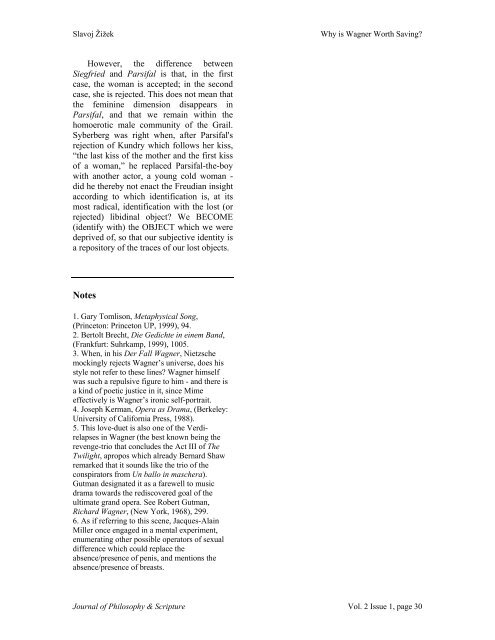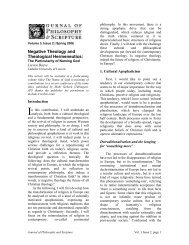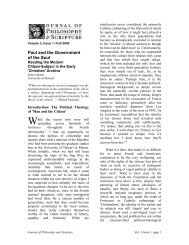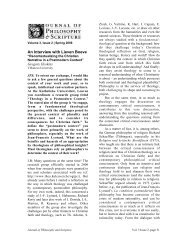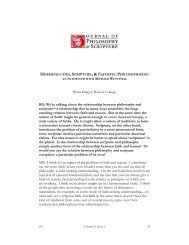Why is Wagner Worth Saving? Slavoj Žižek - Journal of Philosophy ...
Why is Wagner Worth Saving? Slavoj Žižek - Journal of Philosophy ...
Why is Wagner Worth Saving? Slavoj Žižek - Journal of Philosophy ...
Create successful ePaper yourself
Turn your PDF publications into a flip-book with our unique Google optimized e-Paper software.
<strong>Slavoj</strong> Žižek<br />
<strong>Why</strong> <strong>is</strong> <strong>Wagner</strong> <strong>Worth</strong> <strong>Saving</strong>?<br />
However, the difference between<br />
Siegfried and Parsifal <strong>is</strong> that, in the first<br />
case, the woman <strong>is</strong> accepted; in the second<br />
case, she <strong>is</strong> rejected. Th<strong>is</strong> does not mean that<br />
the feminine dimension d<strong>is</strong>appears in<br />
Parsifal, and that we remain within the<br />
homoerotic male community <strong>of</strong> the Grail.<br />
Syberberg was right when, after Parsifal's<br />
rejection <strong>of</strong> Kundry which follows her k<strong>is</strong>s,<br />
“the last k<strong>is</strong>s <strong>of</strong> the mother and the first k<strong>is</strong>s<br />
<strong>of</strong> a woman,” he replaced Parsifal-the-boy<br />
with another actor, a young cold woman -<br />
did he thereby not enact the Freudian insight<br />
according to which identification <strong>is</strong>, at its<br />
most radical, identification with the lost (or<br />
rejected) libidinal object? We BECOME<br />
(identify with) the OBJECT which we were<br />
deprived <strong>of</strong>, so that our subjective identity <strong>is</strong><br />
a repository <strong>of</strong> the traces <strong>of</strong> our lost objects.<br />
Notes<br />
1. Gary Toml<strong>is</strong>on, Metaphysical Song,<br />
(Princeton: Princeton UP, 1999), 94.<br />
2. Bertolt Brecht, Die Gedichte in einem Band,<br />
(Frankfurt: Suhrkamp, 1999), 1005.<br />
3. When, in h<strong>is</strong> Der Fall <strong>Wagner</strong>, Nietzsche<br />
mockingly rejects <strong>Wagner</strong>’s universe, does h<strong>is</strong><br />
style not refer to these lines? <strong>Wagner</strong> himself<br />
was such a repulsive figure to him - and there <strong>is</strong><br />
a kind <strong>of</strong> poetic justice in it, since Mime<br />
effectively <strong>is</strong> <strong>Wagner</strong>’s ironic self-portrait.<br />
4. Joseph Kerman, Opera as Drama, (Berkeley:<br />
University <strong>of</strong> California Press, 1988).<br />
5. Th<strong>is</strong> love-duet <strong>is</strong> also one <strong>of</strong> the Verdirelapses<br />
in <strong>Wagner</strong> (the best known being the<br />
revenge-trio that concludes the Act III <strong>of</strong> The<br />
Twilight, apropos which already Bernard Shaw<br />
remarked that it sounds like the trio <strong>of</strong> the<br />
conspirators from Un ballo in maschera).<br />
Gutman designated it as a farewell to music<br />
drama towards the red<strong>is</strong>covered goal <strong>of</strong> the<br />
ultimate grand opera. See Robert Gutman,<br />
Richard <strong>Wagner</strong>, (New York, 1968), 299.<br />
6. As if referring to th<strong>is</strong> scene, Jacques-Alain<br />
Miller once engaged in a mental experiment,<br />
enumerating other possible operators <strong>of</strong> sexual<br />
difference which could replace the<br />
absence/presence <strong>of</strong> pen<strong>is</strong>, and mentions the<br />
absence/presence <strong>of</strong> breasts.<br />
<strong>Journal</strong> <strong>of</strong> <strong>Philosophy</strong> & Scripture Vol. 2 Issue 1, page 30


